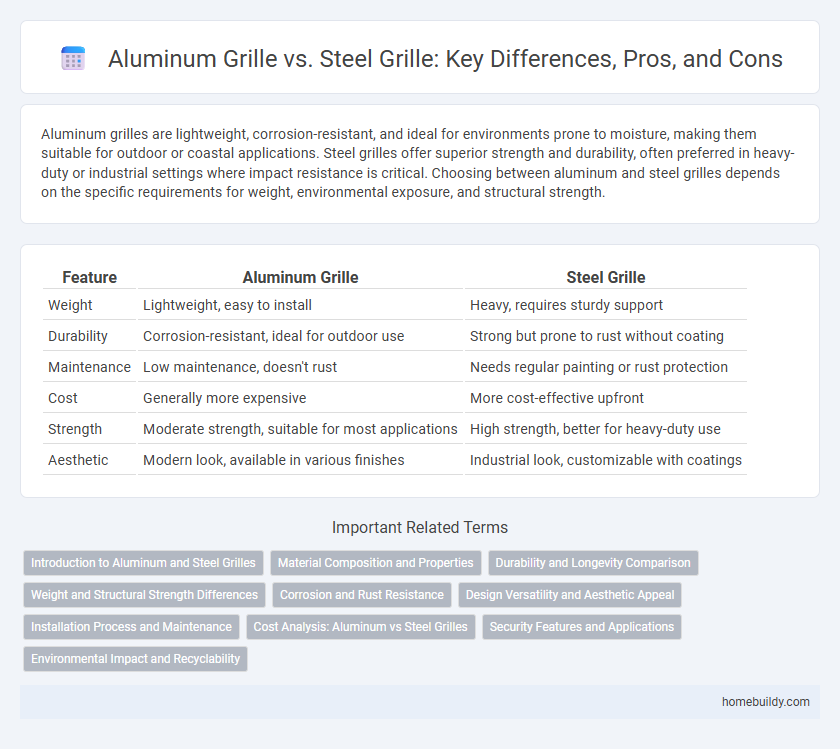Aluminum grilles are lightweight, corrosion-resistant, and ideal for environments prone to moisture, making them suitable for outdoor or coastal applications. Steel grilles offer superior strength and durability, often preferred in heavy-duty or industrial settings where impact resistance is critical. Choosing between aluminum and steel grilles depends on the specific requirements for weight, environmental exposure, and structural strength.
Table of Comparison
| Feature | Aluminum Grille | Steel Grille |
|---|---|---|
| Weight | Lightweight, easy to install | Heavy, requires sturdy support |
| Durability | Corrosion-resistant, ideal for outdoor use | Strong but prone to rust without coating |
| Maintenance | Low maintenance, doesn't rust | Needs regular painting or rust protection |
| Cost | Generally more expensive | More cost-effective upfront |
| Strength | Moderate strength, suitable for most applications | High strength, better for heavy-duty use |
| Aesthetic | Modern look, available in various finishes | Industrial look, customizable with coatings |
Introduction to Aluminum and Steel Grilles
Aluminum grilles offer superior corrosion resistance and lightweight properties, making them ideal for environments exposed to moisture or requiring easy installation. Steel grilles provide enhanced strength and durability, suitable for heavy-duty applications and high-impact resistance. Both materials serve crucial roles in ventilation and security systems, with aluminum favored for its longevity and steel for its robustness.
Material Composition and Properties
Aluminum grilles feature a lightweight, corrosion-resistant composition that enhances durability and reduces maintenance compared to steel grilles. Steel grilles, made from carbon or stainless steel, offer superior strength and rigidity but are prone to rust without proper coating or galvanization. The thermal conductivity of aluminum also provides better heat dissipation, making it ideal for applications requiring high temperature resistance.
Durability and Longevity Comparison
Aluminum grilles offer superior corrosion resistance compared to steel grilles, making them ideal for environments exposed to moisture or harsh weather conditions. Steel grilles, while stronger and more impact-resistant, are prone to rust over time unless properly coated or galvanized. Overall, aluminum grilles provide longer-lasting durability with lower maintenance requirements, whereas steel grilles require regular upkeep to maintain longevity.
Weight and Structural Strength Differences
Aluminum grilles offer a significant weight advantage due to aluminum's low density, making them easier to handle and install compared to steel grilles. Despite being lighter, aluminum boasts excellent corrosion resistance but generally has lower structural strength than steel, which provides superior durability and load-bearing capacity. Steel grilles are preferred in applications requiring enhanced toughness and impact resistance, while aluminum is ideal for lightweight, corrosion-sensitive environments.
Corrosion and Rust Resistance
Aluminum grilles offer superior corrosion and rust resistance compared to steel grilles, making them ideal for outdoor and humid environments. The natural oxide layer on aluminum prevents oxidation, while steel grilles require protective coatings to resist rust. Over time, aluminum grilles maintain their structural integrity and appearance better in corrosive conditions than uncoated or poorly treated steel grilles.
Design Versatility and Aesthetic Appeal
Aluminum grilles offer superior design versatility due to their lightweight nature and corrosion resistance, allowing for intricate patterns and custom shapes without compromising structural integrity. Steel grilles provide a more robust and industrial aesthetic but are heavier and prone to rust, limiting design options and requiring additional maintenance. The choice between aluminum and steel grilles significantly impacts aesthetic appeal, with aluminum favored for modern, sleek designs and steel preferred for traditional, heavy-duty applications.
Installation Process and Maintenance
Aluminum grilles offer a lightweight structure that simplifies the installation process with fewer tools and reduced labor time compared to steel grilles, which require heavy-duty equipment due to their weight. Maintenance for aluminum grilles is easier, benefiting from natural corrosion resistance and requiring only periodic cleaning, whereas steel grilles need regular inspections, rust prevention coatings, and potentially more frequent repairs. The longevity and reduced maintenance costs make aluminum grilles a practical choice for both residential and commercial projects.
Cost Analysis: Aluminum vs Steel Grilles
Aluminum grilles typically cost 20-30% more than steel grilles due to higher raw material prices and manufacturing processes. Despite the upfront expense, aluminum offers superior corrosion resistance and lower maintenance costs, which can reduce total ownership costs over time. Steel grilles provide greater strength at a lower initial cost but may incur higher expenses for rust prevention and repainting over their lifespan.
Security Features and Applications
Aluminum grilles offer excellent corrosion resistance, making them ideal for outdoor security applications in coastal or humid environments where steel may rust. Steel grilles provide superior strength and impact resistance, enhancing security in high-risk areas such as industrial sites and commercial properties. Both materials are versatile, but steel grilles are often preferred for reinforced protection, while aluminum grilles are favored for lightweight, durable security solutions.
Environmental Impact and Recyclability
Aluminum grilles have a lower environmental impact compared to steel grilles due to their lightweight nature, which reduces transportation emissions and energy consumption during manufacturing. Aluminum is highly recyclable, retaining its properties indefinitely without quality loss, leading to a circular production cycle that minimizes resource depletion. Steel grilles also offer recyclability benefits but require more energy for recycling processes and contribute to higher carbon emissions due to their heavier weight.
aluminum grille vs steel grille Infographic

 homebuildy.com
homebuildy.com